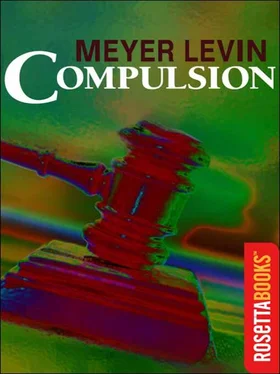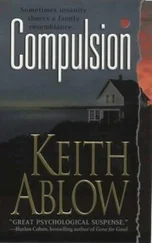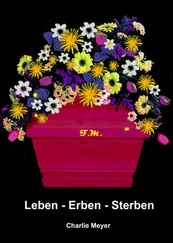Tom said nobody was bothering Artie much; he was just sitting in there. And Judd, at the La Salle Hotel, was still sticking to his alibi about their picking up the two girls. But Artie didn’t confirm Judd’s story.
Late into the night, the situation remained unchanged. Judd had no idea that Artie was failing to corroborate his tale. Cool, in perfect control of himself, he kept repeating the details of the story, how they had picked up the girls, Edna and Mae, how they had taken them to the Coconut Grove and then to Jackson Park. He even appealed to Horn to have the newspapers request the girls to come forward. And so detailed was Judd’s story, in contrast to Artie’s vagaries, that Padua himself finally went over to question Artie. It seemed impossible, Padua remarked, that he couldn’t recall what he had done nine days ago.
“Well, can you?” Artie challenged.
Padua tried, and after a while, managed. But Artie had had his laugh.
Then Padua asked, had Artie ever had dinner at the Coconut Grove?
“The Grove? Lots of times.” He had dragged all kinds of dates there.
Had he been in one of the parks, that Wednesday? Jackson Park? Lincoln Park?
Had he ever heard of a girl named Edna? Or Mae?
So Artie surely knew, then, that Judd was using the alibi; still he did not corroborate the story. He became a little more doubtful, saying he must have been blotto most of that day; he couldn’t remember anything for sure.
Padua left Artie and returned to Horn’s suite at the La Salle. Now the questioning of Judd became a little harder. They shoved an envelope in front of him, and had him print out Kessler’s name and address. Then over again. And again.
Several times I stepped out of the College Inn to see if the lights were still on, up on the eighth floor. “Do you think he is getting the third degree?” Myra would ask breathlessly when I returned. “Artie looks strong but he isn’t,” she said. “They could make him confess to anything!”
I reminded her that the State’s Attorney would be a little careful with a Straus. Myra shuddered. “Ply me with liquor,” she said, and I replenished her glass. Then we danced.
Dancing belly to belly, Myra whispered she wished she could get up the nerve to give herself to Artie. Virginity was just a rag; a girl should have the courage of her convictions. She didn’t want to be a fake – did I think she was a fake? But then, it wasn’t only sex attraction between her and Artie. She was his real friend. As far back as when he had that awful governess, Miss Nuisance – Newsome. Again, Myra sucked in her underlip. What a game it had been for years to fool Miss Nuisance, who practically never let Artie out of her sight, making a model boy out of him. The triumph was every Saturday afternoon, when Artie wanted to see the serial movies – you know, where the heroine was tied to the tracks, and the train was coming. Artie loved them, The Perils of Pauline , and of course Miss Nuisance would never allow him to see such things. So on Saturday afternoons he was supposed to go to the Children’s Symphony, with Myra, and her mother would leave them in the concert hall while she went shopping, and then Artie would slip out to a movie on South State Street, and Myra would cover up for him. Oh, the angelic face on Artie when he told Miss Nuisance about the symphony!
I thought of the college-boy face on Artie, upstairs now answering their questions, and I thought of the easy laugh of Artie at the frat, telling us how he had got by some gullible prof with a borrowed term paper, and then I thought of that ghastly remark about the “cocky little punk”. Something must have shown in my face, for suddenly Myra’s fingers dug into my shoulder, frantically. “Oh, Sid, I’m saying all the wrong things. Sid, you believe he could have done it! You don’t know him, you don’t know him!” she pleaded desperately. “He’s just a playful kid. Judd is trying to drag him into it. Judd could have done anything!”
In her hoarse, almost sepulchral voice, Myra kept begging me to say I didn’t believe Artie could have done a thing like that. Instead, something in me kept pressing forward those words of Artie’s; I kept wanting to tell her his remark: “the cocky little punk.” But I couldn’t let myself add to her fear. I began arguing it down in myself. A murderer would never have made a remark like that, a dead giveaway.
We left the Inn. Up there in the County Building, the lights had gone out. “Do you think he is still there?” Myra asked. I said probably he had been taken somewhere for the night.
Not to jail! Oh, why didn’t Artie just leave that devil Judd to his fate!
It was after three. Myra couldn’t bear to go home yet; she wanted to walk to the lake. As we walked, her spirits lifted. She quoted Edna St. Vincent Millay, about burning the candle at both ends, and about the ferryboat, and then I quoted Carl Sandburg about the lake and the fog coming in on little cat feet. Some day, she said, perhaps I would get to know the real Artie who was like us, who was only trying to escape the futility, the nothingness, of the world. It was nearly four when we got into a cab.
In the lobby of her hotel, there were only a few lights. Out of sight of the desk, she told me good night, and then turned her whole body to mine, her mouth to be kissed. It was partly the conventional goodnight kiss of a date, and yet it was voracious, with a ghastly emptiness.
Then in her husky voice, she begged that whatever I did, I wouldn’t put her name in the paper. I said of course not, as if it were sacred.
I had the driver take me back downtown to the La Salle. Tom was just coming through the lobby. “They took them someplace to sleep,” he said. “That’s all for tonight.”
We sat in an all-night Thompson’s. We went over everything again. I described both girls, feeling myself a betrayer, but telling myself it was not for the paper; it was truly to help solve the crime that I betrayed their emotions. I told about Ruth. “She really feels Judd could have done it; I can tell. Something happened between them in the last few days – I don’t know. But when I told her about the glasses-”
“That’s your girl, Ruth,” Tom said.
I said Myra too believed Judd could have done it. But not Artie.
Tom looked up with an odd smile. Nobody had really suggested it could have been Artie. He was only being held because of Judd’s phony alibi. So why had Artie’s girl felt she had to deny the possibility?
Then I recognized that Myra was as afraid as Ruth.
The families, Tom said, seemed not to be worried. They had called Horn, and he had assured them the boys would be sent home as soon as certain technicalities were clarified.
And that seemed all that was known. “Listen,” I said to Tom, “I promised we wouldn’t use the names of the girls.” He shrugged.
We went out and picked up the morning papers. The Tribune had dug up some campus talk about Judd: “a brilliant atheist.” His friend Artie Straus, it said, had not yet confirmed Judd’s alibi.
And there was one new item, exclusive. A chisel had been picked up on the night of the murder by a private night watchman who had seen it thrown from a car, on Ellis Avenue, not far from the Kessler house. The blade of the chisel was wrapped in adhesive tape. There was blood on the tape. The chisel was believed to be the murder weapon. And the car from which it had been thrown was a dark sports model. It could have been a Stutz, like the one owned by Judd Steiner.
The Examiner had more about the millionaire playboy suspects. Judd was a strange sinister genius who kept to himself. Artie, whom Judd was trying to involve in his alibi, was one of the most popular men on campus, especially with the girls. Myra ’s name was mentioned, as was Dorothea Lengel’s – “girls of good family” often seen with him.
Читать дальше












